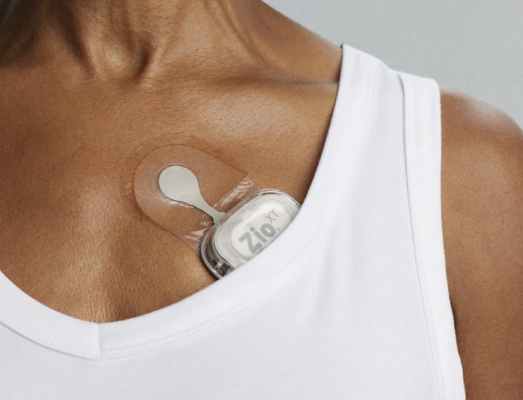
March 13, 2023 — iRhythm Technologies, Inc., a leading digital health company focused on creating trusted solutions that detect, predict, and prevent disease, recently presented the results of multiple new studies at the American College of Cardiology’s Annual Scientific Session Together With the World Congress of Cardiology (ACC.23/WCC).
The CAMELOT study, titled “Comparative Effectiveness Of Ambulatory Monitors For Arrhythmia Diagnosis: A Retrospective Analysis Of Medicare Beneficiaries,” demonstrated that:
- Long-term continuous monitoring (LTCM) with Zio XT is associated with the highest diagnostic yield and the fastest time to clinical diagnosis compared to all other ambulatory cardiac monitors (ACM) when looking at specified arrhythmias.
- Zio XT has the lowest likelihood of retesting compared to all other ACMs.
- Zio XT is associated with the lowest acute care healthcare resource utilization compared to all other ACMs.
The CAMELOT study is the largest and most contemporary real-world, comparative effectiveness analysis1,2 of ambulatory cardiac monitoring. Using a full (100%) sample of Medicare data, the study sought to evaluate yield of clinical diagnosis, retesting rates, and health care utilization across four categories of ambulatory cardiac monitoring: Holter, long-term continuous monitoring (LTCM), mobile cardiac telemetry (MCT), and ambulatory event monitor.
The principal finding is that Zio XT, prescribed for up to 14 days of monitoring, is associated with the highest diagnostic yield and fastest time to diagnosis, lowest odds of 180-day retesting, and the lowest risk of emergency department and inpatient hospitalization compared to Holter, MCT, ambulatory event monitors, and other LTCM services.
“Ambulatory external ECG monitoring is being widely used in clinical practice. Providers have choices of various types of ECG monitors, as well as choice of several vendors. There has previously been no attempt to determine whether these choices influence important endpoints such as diagnostic yield or need for re-testing,” said Suneet Mittal, MD, director of electrophysiology at Valley Health System and presenting author of the study. “The CAMELOT study provides real world evidence that these choices indeed impact these outcomes and may inform how providers make these choices in clinical practice.”
The presented findings demonstrated that all other monitoring services (including non-Zio LTCM) had an odds of clinical arrhythmia diagnosis that was 20%-50% less than Zio XT after controlling for other variables. All other monitoring services also had 1.4 to 5.7 greater odds of subsequent retesting compared to Zio XT.
“This study is an important milestone because it takes what we already know about our technology, service, clinical experience, and patient experience — and shows how this translates into superiority of Zio XT for meaningful clinical outcomes across the landscape of ambulatory monitoring,” said Mintu Turakhia, MD, MAS, chief medical officer and chief scientific officer at iRhythm. “CAMELOT shows how consequential choosing the right monitoring service can be, from achieving a faster clinical diagnosis leading to reduced repeated testing all the way to lower emergency and inpatient health care utilization and lower costs.”
Outside of CAMELOT, other notable studies were presented at ACC.23/WCC. The Zio monitor post-approval extended wear study, titled “Initial Real World And Clinical Experience Of The Next Generation Ambulatory ECG Zio Monitor: Implications For Standard And Extended Wear Monitoring,” compared Zio XT with the next generation Zio monitor. It found the Zio monitor demonstrated even higher compliance, higher ECG analyzable time, increased wear time and improved signal quality than Zio XT. Post-clearance evaluations of this next generation ECG monitor showed consistent and even improved performance compared to Zio XT, with potential to greatly improve monitoring and decision-making. The Zio monitor was designed with even greater patient comfort in mind – consisting of a new wearable biosensor that is 72% smaller and 55% lighter while also incorporating a new breathable adhesive. It is currently in limited commercial release in the United States, with a full commercial launch planned for later in 2023.
The results of the VT prognostic value study, titled “Prevalence And Prognostic Value Of Ventricular Tachycardia On Ambulatory ECG Monitoring,” found that non-sustained ventricular tachycardia was independently associated with increased mortality, and may act as a proxy biomarker for cardiovascular risk.
Learn more about the CAMELOT study here. To learn more about iRhythm, please visit the website.
References:
1 Reynolds et al. Comparative effectiveness of ambulatory monitors for arrhythmia diagnosis: A retrospective analysis of Medicare beneficiaries managed with ambulatory cardiac monitors between 2017 and 2019. Accepted for ACC.23 presentation, presented in New Orleans, LA.
2 Data on file. iRhythm Technologies, 2023.


 July 31, 2024
July 31, 2024 









